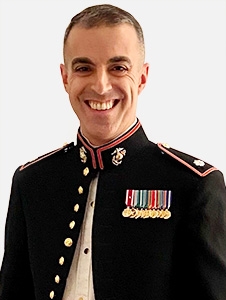Tony Garofano ’04
“From combat and strategic competition to humanitarian assistance, and all the staff work in between, military service offers new and diverse chances to contribute every day, and true satisfaction when a mission is accomplished.”

Why did you decide to pursue national service and the military?
I was a sophomore at Middlebury when September 11 happened. A month after the terrorist attacks, a Marine Corps recruiter sent an email explaining Officer Candidate School (OCS) (offered in the summers between academic years) and I was intrigued. There is no commitment to joining the Marine Corps even after completing OCS, but I was convinced it was the right choice for me following that summer and ultimately commissioned as a 2nd lieutenant upon graduation. I had learned during previous jobs that I needed more than just money as motivation, and supporting and defending the Constitution of the United States against all enemies, foreign and domestic, is an ideal that really does work. So does being surrounded by Americans from every background who are similarly motivated. More than 20 years later, that remains just as true, and I am glad every (most?) day that my 19-year-old self replied to that email.
How did your Middlebury liberal arts education factor into the mindset, perspectives, approach you took to your military service?
I learned at Middlebury not only the fundamental skills of a good military officer (and attorney) such as critical thinking and persuasive communication, but also the importance of approaching every problem from the individual, community, national, and global perspectives—the tactical, operational, and strategic levels in military terms. My history and classics majors also gave me a broader perspective on how humans have dealt with problems at those levels over thousands of years. Military decisions at all echelons are better when informed by an understanding of where we have come from—and others’ perspectives on that shared history.
I think that is especially true in my current job where I help advise a four-star combatant commander on how to best support the NationalDefense Strategy, Ukraine, and NATO while complying with the law and constantly evolving national policy (not to mention avoiding U.S.conflict with Russia). Whether it is Thucydides, 20th-century history, or basic values of humanity that I learned in the Green Mountains a few (many!) years ago, I am confident I give better advice on these complex problems because of Middlebury.
Middlebury has an ethic of service to a community. What do you want to tell others about serving your community or your country through military service?
Military service demands significant physical, mental, and moral contributions. It can be painful, exhausting, stressful, and ethically complex. The challenges include the full spectrum of what can be asked of a person and offered to a community. From combat and strategic competition to humanitarian assistance, and all the staff work in between, military service offers new and diverse chances to contribute every day, and true satisfaction when a mission is accomplished. But it is hardly costless, as the suffering of many veterans over the last two decades has starkly illustrated. We have an ongoing duty of care to all those who have served the nation, and they constitute another community deserving of our service.
What advice would you give to others who may be considering military service?
Do it. It is not a lifelong commitment, but it will make you stronger for the rest of your life. And join the Marine Corps. If something is worth doing it is worth doing the hardest way possible (that is the saying, right?).
I would add more seriously that military service after graduating from college offers you a fast track to some of the most demanding personal and leadership challenges any 21-year-old can face. If you want some part of your life to be devoted to service, to have experiences that will fortify you against any challenges in your future, and to engage your whole self (mind, body, and morals), you will find exactly that in the military. And if you go to OCS and find this advice is entirely wrong, you can simply say no thank you and walk away.
Is there anything else you would like to share about your experience?
For those of us with limited exposure to the military growing up, myself included, movies and other entertainment provided our main picture of military service. Notably missing from that picture: The incredible diversity of jobs and opportunity. As just a judge advocate (lawyer), I have been a prosecutor, defense counsel, infantry battalion staff officer, headquarters company commander, Congressional staffer, legislative liaison, student at military and civilian schools, and deputy general counsel. And lived in California, Afghanistan, D.C., Boston, Japan, Kuwait, and Germany. Plus trips to more than 60 other countries. I have never been bored. Uncomfortable, nervously learning a completely new job as fast as possible, at the edge of my seat? Absolutely. But never bored.
Also, something I did not realize before was the premium the military places on higher education. Every single officer in my building (lawyer, pilot, infantry, artillery, whatever) has at least one advanced degree, and has been to multiple professional military schools throughout their career. I have never stopped learning. Middlebury was the perfect place for that career of lifelong learning to start.

